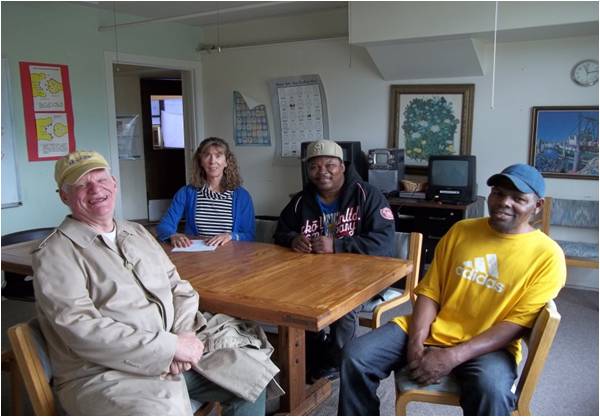You are here
 As the number of US adults over 65 is expected to increase to 70 million by 2030, the population of older adults with psychiatric disabilities is also predicted to increase over the next two decades. The psychiatric rehabilitation field needs to address the needs of what will be a growing number of older adults receiving behavioral healthcare services. Among older adults with psychiatric disabilities, rates of medical morbidity are high and research shows they receive few preventative screenings, have had few labs ordered for them, and continue to have little access to lifestyle interventions in community mental health settings. Furthermore, many older adults with schizophrenia experience significant remission in their psychotic symptoms as they age, yet suffer from medical co morbidities that can undermine psychiatric gains.
As the number of US adults over 65 is expected to increase to 70 million by 2030, the population of older adults with psychiatric disabilities is also predicted to increase over the next two decades. The psychiatric rehabilitation field needs to address the needs of what will be a growing number of older adults receiving behavioral healthcare services. Among older adults with psychiatric disabilities, rates of medical morbidity are high and research shows they receive few preventative screenings, have had few labs ordered for them, and continue to have little access to lifestyle interventions in community mental health settings. Furthermore, many older adults with schizophrenia experience significant remission in their psychotic symptoms as they age, yet suffer from medical co morbidities that can undermine psychiatric gains.
Thresholds, a psychosocial rehabilitation center that serves Chicago and the surrounding area, is Illinois’ largest and oldest provider of community behavioral healthcare and mental health services. Since 2009, Thresholds has been addressing the unique needs of older adults through two pilot projects, both using the Integrated Illness Management and Recovery curriculum.
As part of a growing movement to integrate primary care with mental health care and provide more holistic treatment for individuals with psychiatric disabilities, an adapted version of the more widely known Illness Management and Recovery (IMR) has been created, called Integrated Illness Management and Recovery (I-IMR). This includes education and illness management support for medical conditions, as well as the addition of facilitating and coordinating primary care. Integrating primary care into mental treatment could reduce costly emergency room use and nursing home placements for older adults, and facilitate the natural course of schizophrenia and other psychiatric disabilities.
Both formats are very similar and provide a possible avenue to address the needs of aging individuals in recovery. Both the group and individual models rely on a nurse health care manager and practitioner of psychiatric rehabilitation dyad to perform a combination of service coordination and care management functions. Working as a team, the two facilitate, coordinate, and monitor primary medical care in addition to providing education and illness management targeting both psychiatric and medical conditions. In weekly one-on-one meetings with persons in recovery, the nurse and PSR practitioner follow the I-IMR curriculum. In the group format, the nurse and PSR practitioner teach the curriculum to a weekly group and also incorporate an exercise component into each session, such as walking. The group provides the added benefit of peer support among those in recovery, group problem-solving, and building a culture of healthy living within the agency as the group meets on site.
The first meetings of the program entail:
- 1. Taking a comprehensive health history of each individual along with evaluating their use of preventative health services.
- 2. Identifying participants’ healthcare providers and obtaining written consent for the nurse to have access to clinical records.
- 3. Taking vital signs and other clinical information by the nurse care manager.
- 4. Using motivational interviewing techniques and drawing on the participant’s own experience and priorities to help participants set their physical and mental health goals. Participants generally identify 2-4 goals to work on.
As the intervention goes along, the nurse and PSR practitioner review the educational material on the interaction of common physical and mental health conditions, teach coping and social skills, and support the individual in their weekly sessions as they work toward their goals. The nurse conducts periodic health status assessments that include blood pressure readings, heart rate, weigh-ins, and pulse. Meeting frequency is dependent on resources/access to health care, stability of medical problems, and ability to self manage symptoms/illness. The nurse and PSR practitioner also meet weekly to discuss service coordination and correspond as needed throughout the week.
As the evidence base for I-IMR grows, there is hope that older adults with psychiatric disabilities will receive the wrap-around care and services they need and deserve within the mental health system. This innovative program is right on track with the country’s movement toward integrated care as the Affordable Care Act takes momentum. I-IMR for older adults fills a pressing need within the recovery community and country at large.



